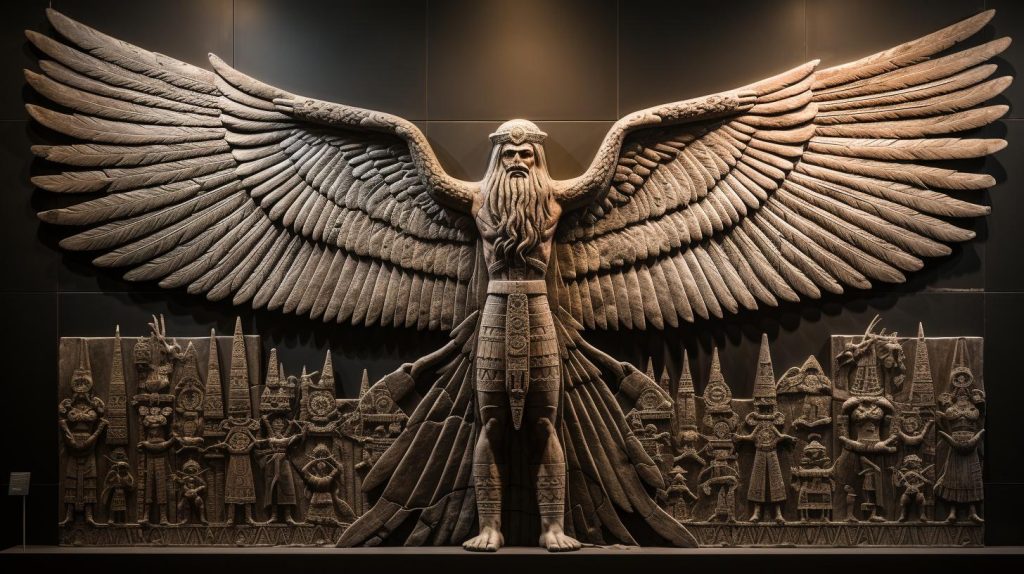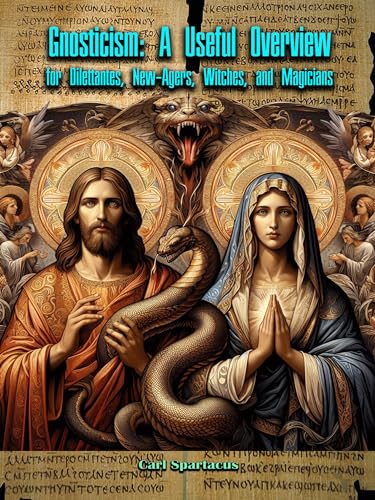What is Gnosticism?
Gnosticism, a multifaceted religious and philosophical movement, emerged in the Hellenistic period and thrived alongside Christianity. The term “Gnosticism” is derived from the Greek word “gnōsis,” which refers to a deep personal knowledge or understanding that transcends the physical world. Gnostics believed that this knowledge, or gnosis, held the key to liberating the soul from its imprisonment in the material realm.

The Complexity of Gnostic Beliefs
Gnosticism defies easy categorization due to its decentralized nature and lack of uniform doctrine. Unlike organized religions such as Christianity or Judaism, Gnosticism encompasses a wide range of beliefs and practices that varied across different regions and time periods. This complexity makes Gnosticism a fascinating subject for scholars seeking to unravel its enigmatic nature.
2. Origins of Gnosticism
Interactions with Christianity and Judaism
The origins of Gnosticism are intertwined with both Christianity and Judaism. While the exact relationship between Gnosticism and these religions remains a subject of debate, there is evidence of mutual influence and synchronization. Gnostic ideas and themes can be found in early Christian texts, especially in the Gospel of John, which bears a striking resemblance to Gnostic cosmology.
The Influence of Gnostic Ideas on Christian Scriptures
Gnosticism’s influence on early Christianity is evident in several New Testament writings. The Gospel of Thomas, for example, contains teachings attributed to Jesus that resonate with Gnostic concepts of secret knowledge and the divine spark within. However, as orthodox Christianity solidified its doctrines, Gnostic beliefs were gradually marginalized and labeled as heretical.
3. Gnostic Beliefs and Philosophy
The Fallen World and the Divine Spark
At the heart of Gnosticism is the belief in a fallen, broken world created by a lesser deity known as the Demiurge. According to Gnostic cosmology, this imperfect physical realm is a result of the Demiurge’s defiance of the supreme divine entity. Gnostics viewed the material world as a prison that separates humans from their true divine origins.
The Demiurge and the Creation of the Material Realm

In Gnostic thought, the Demiurge is often equated with the creator god of the Hebrew Bible. Gnostics saw this figure as an inferior and malevolent deity, responsible for trapping divine sparks, or souls, within physical bodies. The material realm, according to Gnostics, is a product of the Demiurge’s flawed creation, designed to blind humans to their true nature and the higher spiritual realms.
The Importance of Secret Knowledge (Gnosis)

Gnostics believed that liberation from the material world could only be achieved through secret knowledge, or gnosis. This knowledge, reserved for the elect, revealed the true nature of the cosmos and the path to spiritual enlightenment. Gnostic texts, often written in cryptic language, contained these hidden truths, which were said to have been revealed by Jesus to his closest disciples.
The Role of Jesus and His Disciples in Gnosticism
In Gnostic mythology, Jesus plays a central role as a divine figure who imparts secret knowledge to his disciples. Gnostics believed that Jesus’ teachings were veiled in parables and symbolic language, requiring interpretation to uncover their true meaning. This emphasis on Jesus as a revealer of hidden truths distinguishes Gnostic interpretations of Christianity from orthodox doctrines.
4. Gnostic Practices and Rituals
Asceticism and Self-Denial
Many Gnostic sects practiced asceticism, embracing a lifestyle of self-denial and renunciation of worldly pleasures. By rejecting the material realm and its temptations, Gnostics sought to purify their souls and attain spiritual liberation. Some extreme forms of Gnosticism even advocated radical forms of asceticism, including severe fasting and bodily sacrifice.
Initiation and Mystical Experiences
Gnosticism placed great importance on individual spiritual experiences and revelations. Gnostic initiates would undergo rituals and ceremonies designed to awaken their inner divinity and facilitate encounters with the divine realm. These mystical experiences provided Gnostics with a direct connection to the transcendent truths of the cosmos.
The Importance of Individual Revelation
Unlike orthodox Christianity, which emphasizes collective religious experiences and the teachings of church authorities, Gnosticism emphasized personal revelation and individual interpretation of spiritual truths. Gnostics believed that each person possesses a divine spark within, enabling them to discover their own unique path to salvation and enlightenment.
5. Gnosticism and Other Religions
Gnostic Influences on Christianity
Gnosticism’s influence on Christianity is evident in the early development of Christian theology and the shaping of Christian scriptures. Gnostic ideas, such as the concept of a divine spark within each individual and the importance of secret knowledge, left a lasting impact on the formation of Christian doctrines. The Gospel of John, with its mystical and symbolic language, bears traces of Gnostic thought.
Gnosticism’s Impact on Ancient and Modern Philosophies
Gnosticism’s profound influence extends beyond Christianity. Its ideas and themes have permeated various philosophical and religious traditions throughout history. Gnostic concepts of dualism, the search for hidden truths, and the tension between the spiritual and material realms have found resonance in ancient philosophies such as Neoplatonism and Hermeticism, as well as in modern esoteric and occult movements.
6. Gnosticism in Historical Context
The Spread and Decline of Gnostic Movements
Gnosticism flourished during the early centuries of the Common Era, with various Gnostic sects and schools emerging across the Mediterranean world. However, as orthodox Christianity gained dominance and consolidated its power, Gnostic movements faced persecution and suppression. Gnosticism gradually declined, with its adherents either assimilating into mainstream Christianity or fading into obscurity.
Persecution and Suppression by Orthodox Christianity
Orthodox Christianity viewed Gnosticism as a heretical deviation from accepted Christian doctrines. Early church fathers, such as Irenaeus and Hippolytus, condemned Gnostic beliefs and branded them as dangerous and misleading. The formation of orthodox Christian theology and the canonization of the New Testament further marginalized Gnostic texts and ideas.
7. Gnostic Texts and Scriptures
The Nag Hammadi Library
One of the most significant discoveries shedding light on Gnosticism is the Nag Hammadi library, a collection of Gnostic texts unearthed in Egypt in 1945. These ancient manuscripts, hidden for centuries, provide valuable insights into Gnostic beliefs, rituals, and cosmology. The Nag Hammadi library includes important Gnostic texts such as the Gospel of Thomas, the Gospel of Philip, and the Secret Book of John.
The Gospel of Thomas and Other Gnostic Gospels
The Gospel of Thomas, found within the Nag Hammadi library, is a prominent Gnostic text that contains sayings attributed to Jesus. This gospel emphasizes the importance of spiritual enlightenment and the search for hidden knowledge. Other Gnostic gospels, such as the Gospel of Philip and the Gospel of Mary Magdalene, offer alternative perspectives on Jesus and his teachings.
8. Modern Interpretations of Gnosticism
Gnosticism in Contemporary Literature and Art
Gnosticism’s allure and mystique have captured the imagination of writers and artists throughout history. Contemporary literature, such as the works of Philip K. Dick and Umberto Eco, incorporates Gnostic themes and motifs. Artistic movements, such as Symbolism and Surrealism, also draw inspiration from Gnostic cosmology and philosophy.
Gnostic Themes in Popular Culture
Gnostic ideas and symbols have permeated popular culture in various forms. Films like “The Matrix” and “The Truman Show” explore themes of illusion, enlightenment, and the search for truth, echoing Gnostic concepts of the material world as a deceptive construct. Gnostic symbolism can also be found in music, video games, and other forms of entertainment.
9. Gnosticism’s Enduring Legacy
Influence on Western Esotericism and Occult Traditions
Gnosticism’s profound impact on Western esotericism and occult traditions cannot be overstated. Gnostic concepts of hidden knowledge, the divine spark within, and the tension between good and evil have found resonance in mystical and magical practices throughout history. Gnostic ideas continue to shape modern esoteric traditions such as Hermeticism, Thelema, and Rosicrucianism.
Gnostic Revivals and New Religious Movements
Throughout history, there have been revivals of interest in Gnosticism, with individuals and groups seeking to reclaim and reinterpret its teachings. The 19th-century Gnostic revival, led by figures like Helena Blavatsky and G.R.S. Mead, sought to revive Gnostic ideas within the context of Theosophy. Today, various new religious movements and spiritual communities incorporate Gnostic elements into their beliefs and practices.
10. Misconceptions and Controversies
The Challenge of Defining Gnosticism
Gnosticism’s elusive nature and lack of a uniform doctrine make it challenging to define. Scholars continue to debate its boundaries and whether it should be classified as a religion, a philosophy, or a complex mixture of both. The decentralized and diverse nature of Gnostic beliefs and practices further complicates the task of understanding and categorizing this enigmatic ancient movement.
Gnosticism and Heresy
In the early centuries of Christianity, Gnostic beliefs were deemed heretical by orthodox Christian authorities. The suppression and persecution of Gnostics resulted in the destruction of many Gnostic texts and the marginalization of their ideas. However, the discovery of the Nag Hammadi library and renewed scholarly interest have led to a reassessment of Gnosticism’s place within the broader religious landscape.
11. Gnosticism and the Quest for Meaning
Gnosticism’s Relevance in the Modern World
Despite its ancient origins, Gnosticism continues to resonate with individuals seeking deeper spiritual understanding and meaning in the modern world. Its emphasis on personal revelation, the search for hidden truths, and the liberation of the soul from the material realm speaks to those who question conventional religious doctrines and yearn for a more individualistic spiritual path.
The Allure of Gnostic Philosophy and Spirituality
Gnostic philosophy and spirituality offer a unique perspective on the human condition and the nature of existence. The Gnostic emphasis on personal experience, individual revelation, and the pursuit of hidden knowledge appeals to those who value autonomy and seek a deeper understanding of themselves and the world around them. Gnosticism’s enduring allure lies in its ability to offer an alternative narrative and a path to transcendence.
12. Conclusion
Gnosticism, with its enigmatic beliefs and profound impact on religious and philosophical traditions, remains a captivating subject of study. Rooted in the search for hidden knowledge and the liberation of the soul, Gnosticism challenges conventional religious doctrines and offers a unique perspective on the human experience. As we continue to explore the complexities of Gnosticism, we uncover a rich tapestry of ideas that continue to inspire and intrigue us in the modern world.




No comments! Be the first commenter?